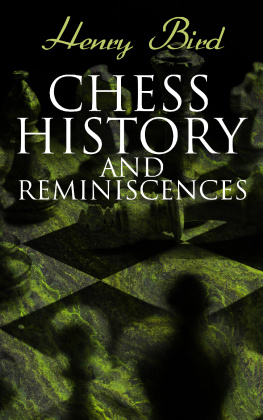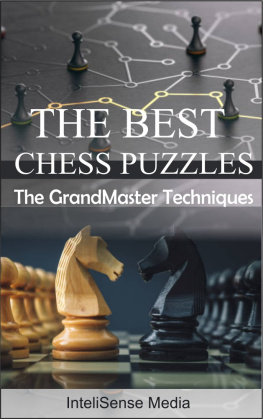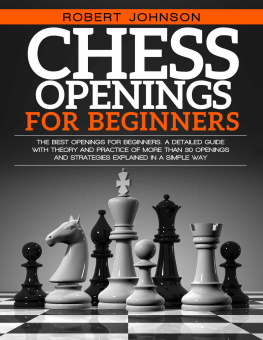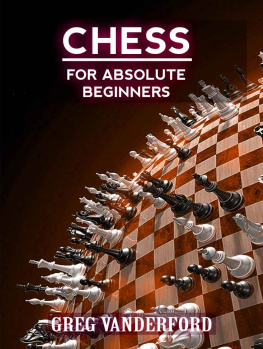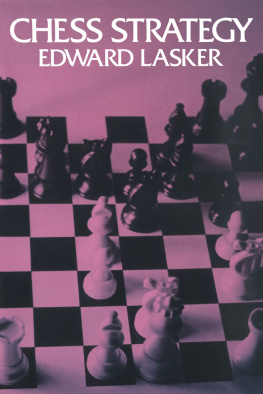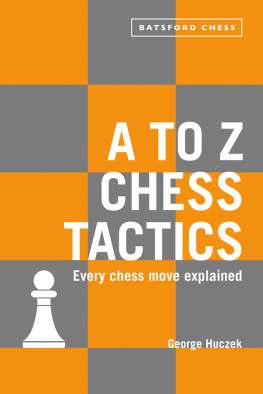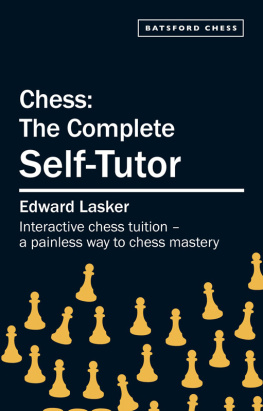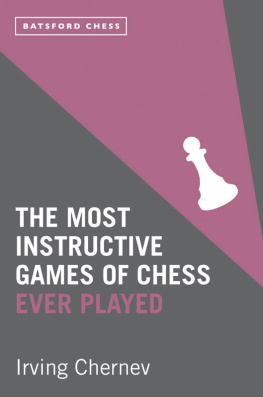CONTENTS
H. E. Bird
CHESS HISTORY AND REMINISCENCES
To
My Highly Esteemed
Chess Opponent And Patron
Of Nearly 40 Years
W. J. EVELYN, Esq.,
Of Wotton, Surrey
PREFACE
This little work is but a condensation and essence of a much larger one, containing the result of what can be discovered concerning the origin and history of chess, combined with some of my own reminiscences of 46 years past both of chess play and its exponents, dating back to the year 1846, the 18th of Simpson's, 9 years after the death of A. McDonnell, and 6 after that of L. de La Bourdonnais when chivalrous and first class chess had come into the highest estimation, and emulatory matches and tests of supremacy in chess skill were the order of the day.
English chess was then in the ascendant, three years before Howard Staunton had vanquished St. Amant of France, and was the recognized world's chess champion, while H. T. Buckle the renowned author of the History of Civilization was the foremost in skill among chess amateurs, Mr. W. Lewis and Mr. George Walker the well known and prolific writers on chess, were among the ten or twelve strongest players, but were seldom seen in the public circle, Mr. Slous and Mr. Perigal were other first rate amateurs of about equal strength. Mr. Daniels who attended Simpson's had just departed. Captain Evans and Captain Kennedy were familiar figures, and most popular alike distinguished and esteemed for amiability and good nature, and were the best friends and encouragers of the younger aspirants.
At this time Simpson's was the principal public arena for first class chess practice and development: the St. George's Chess Club was domiciled in Cavendish Square at back of the Polytechnic. The London Chess Club (the oldest) met at the George and Vulture on Cornhill, when Morphy came in 1858, and Steinitz in 1862, these time honoured clubs were located at King St., St. James, and at Purssell's, Cornhill respectively.
Other clubs for the practice and cultivation of the game were about thirteen in number, representing not five percent of those now existing; the oldest seem to have been Manchester, Edinburgh, and Dublin, closely followed by Bristol, Liverpool, Wakefield, Leeds and Newcastle.
Annual County Meetings commenced with that held at Leeds in 1841. The earliest perfectly open Tournaments were two on a small scale at Simpson's in 1848 and 1849, and the first World's International in the Exhibition year 1851, at the St. George's Chess Club, Polytechnic Building, Cavendish Square. In each of these Tournaments the writer participated.
Three chess columns existed when I first visited Simpson's in 1846, viz., Bells Life managed by Mr. George Walker from 1834 to 1873. The Illustrated London News from 15th February 1845 to 1878, in charge of Howard Staunton, and the Pictorial Times which lasted from February 1845 to June 1848. The first column started had appeared in the Lancet 1823, but it continued not quite one year.
The Chess Player's Chronicle issued in 1841 (Staunton), was then the only regular magazine devoted to chess, but a fly leaf had been published weekly about the year 1840, in rather a curious form of which the following is found noted:
About the year 1840 the Garrick Chess Divan was opened by Mr. Huttman at No. 4 Little Russell St., Covent Garden. One of the attractions of this little saloon was the publication every week of a leaf containing a good chess problem, below it all the gossip of the chess world in small type. The leaf was at first sold for sixpence, including two of the finest Havannah Cigars, or a fine Havannah and a delicious cup of coffee, but was afterwards reduced to a penny without the cigars. The problem leaf succeeding well, a leaf containing games was next produced, and finally the two were merged in a publication of four pages entitled the Palamede.
The Gentleman's Magazine 1824, 1828, British Miscellany 1839, Bath and Cheltenham Gazette 1840, and Saturday Magazine 1840, 1845, had contained contributions in chess, but of regular columns there were only the three before mentioned, now there are about one hundred and fifty, mostly of larger dimensions.
Mr. George Walker's 1000 games published in 1844, gives no game of earlier date than 1780, viz., one of Philidor's of whose skill he gives 62 specimens, and there are 57 games by correspondence played between 1824 and 1844.
The list of chess works of consideration up to Philidor's time, number about thirty, but there were several editions of Jacobus de Cessolus (1275 to 1290) including translations by J. Ferron and Jean De Vigny, from which last named Caxton's book of 1474 was derived.
Lucena, Vicenz, Damiano, and Jacob Mennell appeared before 1520, Ruy Lopez in 1561, Polerio, Gianuzio, Greco, Salvio, Carrera, Gustavus Selenus and the translation of Greco, followed in the interval from 1561 to 1656.
I. Bertin 1735 and the six Italian works of the last century, were the principal which followed with Philidor's manifold editions, up to Sarratt the earliest of the nineteenth century writers.
Dr. A. Van der Linde, Berlin 1874, 1118 pages, 4098 names in Index, and 540 diagrams includes notice of Cotton's complete gamester 1664, and Seymour's complete gamester 1720, with editions of Hoyle's games from 1740 to 1871, in fact about one-fourth of Linde's book is devoted to the specification of books and magazines, mostly of the nineteenth century, even down to the A.B.C. of Chess, by a lady.
Poems have been written on chess, of which the most esteemed
have been Aben Ezra 1175, (translated by Dr. Hyde) Conrad Von
Ammenhusen and Lydgate's "Love Battle" in the fourteenth century
Vida, Bishop of Alba 1525, Sir William Jones 1761, and Frithiofs
Saga by Esaias Tegner 1825.
Of articles which have appeared during the last fifteen years, the Retrospects of Chess in the Times particularly that of the 25th June 1883, (the first on record) mark events of lasting interest in the practice of the game, which would well merit reproduction. Professor Ruskin's modest but instructive letters (28 in number 1884 to 1892), also contain much of value concerning chess nomenclature, annotation, ethics and policy combined with some estimable advice and suggestions for promoting greater harmony in the chess world.
The able article in Bailey's 1885, on chess competitions and the progress of the game, and that in the Fortnightly Review of December 1886, entitled "The Chess Masters of the Day," rank as the other most noteworthy productions of the last seven years' period in chess.
I regret that it is not in my power to produce the more extended work, for to bring that now submitted within assigned compass and cost, I have had to omit much that would be needful to render such a work complete, and to give but a Bird's eye view of chapters which would well merit undiminished space. Thus the complete scores and analyses of the matches, tournaments and great personal tests of skill and statistics of the game would be acceptable to a few, whilst the full accounts of individual players such as Philidor, Staunton, Anderssen, Morphy, Lowenthal, Steinitz, Zukertort, Blackburne and perhaps even Bird, (Bailey's and Ruskin's opinions) would be regarded and read with interest by many chess players.
Respecting the supposed first source of chess the traditional and conjectural theories which have grown up throughout so many ages, regarding the origin of chess, have not become abandoned even in our own days, and we generally hear of one or other of them at the conclusion of a great tournament. It has been no uncommon thing during the past few years to find Xerxes, Palamedes, and even Moses and certain Kings of Babylon credited with the invention of chess.
The conclusions arrived at by the most able and trustworthy authorities however, are, that chess originated in India, was utterly unknown to the Greeks and Romans, and was first introduced into Europe from Persia shortly after the sixth century of our era. In its earliest Asiatic form styled the Chaturanga, It was adapted for four persons, having four small armies of eight each. King, three pieces answering to our Rook, Bishop, and Knight, Elephant (Chariot or Ship,) and Horse, with four Pawns. The players decided what piece to move by the throw of an oblong die.
Next page

